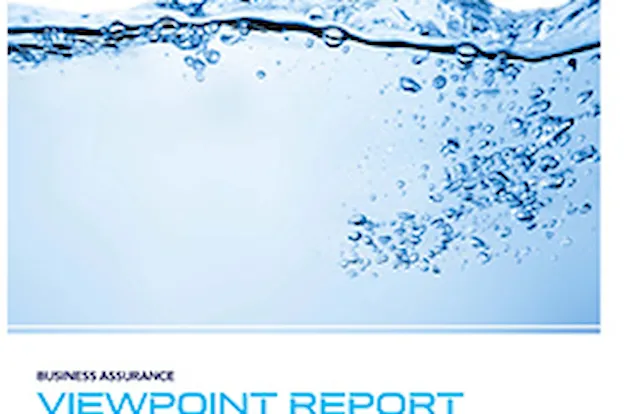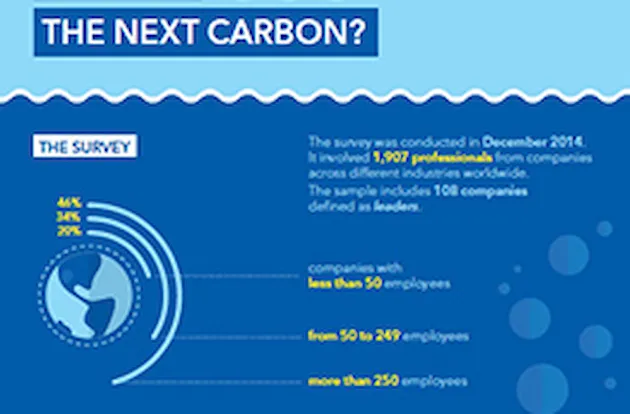Companies' sustainable water management, focus of a new report by UNIDO and DNV GL
The importance of water management and ways companies deal with it, as well as the main drivers and main obstacles to sustainable water management, are the focus of a new study presented online today.
These findings emerge from an international survey conducted in last December by DNV GL - Business Assurance, an international certification body, and the United Nations Industrial Development Organization (UNIDO), and supported by the international research institute GFK Eurisko. The study involved 1,907 professionals from businesses in different sectors in Europe, North America, Central and South America and Asia.
“Water is bound to be one of the goals of the Sustainable Development Goals under discussion at the global level” said LI Yong, the Director General of UNIDO. He commended the report by adding that “this survey is thus very timely and provides insights on the way industries are currently managing water, as well as perceived future opportunities and challenges. Very interestingly, the survey shows also unexpected geographical disparities. The survey results will also allow UNIDO and its partner to refine their approach when providing technical support to government and industries.”
The report suggests that water is a concern at a personal (73 per cent) and societal (83 per cent) level and from a business perspective too. Some 70 per cent of companies consider water management issues to be relevant for their business strategies, and percentages reach 85 among firms using water in their production processes. One out of five companies using water for production is not even aware of the legislation on water in their country. Just over a third of companies around the world already have a water management policy.
The report states that water management remains mainly a matter of efficiency, and that among companies’ main concerns reducing consumption tops the list. Driven by measurement and optimization needs, half of the companies undertook water management initiatives in the last five years. The three most common initiatives are tracking water usage, setting specific goals on water issues, and investing in water efficient devices.
Initiatives are not motivated by the chance of gaining a competitive advantage, nor by pressure from stakeholders. Only 10 per cent of reporting companies are driven by a requirement to disclose hydric performance; pressure from customers and other stakeholders is a minor reason. With compliance with laws and economic reasons as the main drivers, water management again turns out to be bound to efficiency and regularity of company performance.
The paper also shows that companies benefited from water-related initiatives especially in terms of compliance and savings. Economic constraints and the absence of pressure and of an informed awareness on the matter, instead, are the main obstacles to progress on water management. On one hand, businesses are hindered by the lack of management awareness and of consensus about what to do. On the other, they report a lack of financial resources, return on investment and the need to focus on short term results.
Companies expect to focus more on water management in the future and potentials bound to these aspects are very high, both for the reduction in environmental accidents and for the improvement of their performance, thanks to an increase in financial savings and competitive advantage. Activities bound to efficiency will remain the most common actions but there will be significant increases also in more sophisticated activities like staff training and audits.
Commenting on the new report, Luca Crisciotti, CEO of DNV GL - Business Assurance, said: “During the 20th century the demand for water multiplied six fold, while the world’s population doubled. It is evident that water scarcity is a global issue for which we are responsible. Being aware of it is the first step. Businesses are beginning to realize this and they probably would be driven to do more if external pressure from stakeholders was as strong as with aspects like pollution or safety. The first to take action will gain a competitive edge, coming from correct water management and from the possibility of satisfying stakeholder demands for sustainable business.
DNV GL – Business Assurance
DNV GL is a world-leading certification body. We help businesses assure the performance of their organizations, products, people, facilities and supply chains through certification, verification, assessment and training services. Partnering with our customers, we build sustainable business performance and create stakeholder trust.
The DNV GL Group operates in more than 100 countries. Our 16,000 professionals are dedicated to helping our customers make the world safer, smarter and greener.
www.dnvgl.com
UNIDO
www.unido.org


